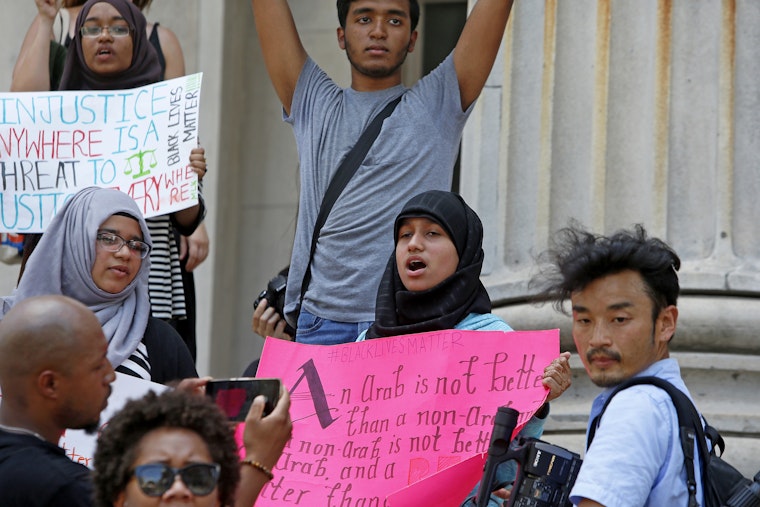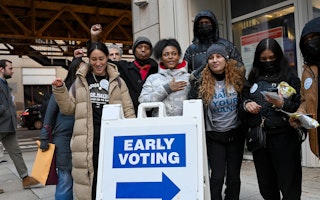The New Face of Solidarity
By Deepa Iyer

A year ago, in August 2015, a group of racial justice leaders gathered in Nashville, Tennessee, for a Solidarity Summit, an initiative to create spaces of learning and inquiry around multiracial solidarity.
In Nashville, we learned from organizations such as the Tennessee Immigrant and Refugee Rights Coalition, from community members active with the local Black Lives Matter chapter, and from advocates mobilizing American Muslims in the area. We also had many meaningful, messy, and difficult conversations about our own work, about when we express (or don’t express) solidarity, and about how much more we still need to learn about each other’s communities and histories of oppression.
That August meeting was the second of three gatherings over the past year and a half, during which we unearthed the common desire to foster deeper connections with each other. We recognized that our ability to demonstrate transformative solidarity in statements and actions is critical in a time of tremendous change in the racial politics of America.
How can black, Native American, and Latinx organizations provide support to Muslim, Arab, Sikh, and South Asian communities experiencing an unprecedented backlash nearly 15 years after the 9/11 attacks? How can Asian American organizations more effectively address antiblack racism and support the movement for black lives? What are the roles of young people—including undocumented youth, black activists, and the “9/11 generation”—in building bridges while disrupting the status quo? What are the “best practices” of multiracial solidarity work happening in local communities around the nation, and what can we learn from them?
One year after the convening in Nashville, our organizations have launched a new campaign called #SolidarityIs. The founding cohort of the campaign includes organizations that are working towards black liberation; addressing the backlash towards Muslim, Arab, Sikh, and South Asian communities; and advocating for the rights of indigenous people, immigrants, and refugees. The campaign seeks to support and catalyze multiracial solidarity amid rising racial anxiety over changing demographics, virulent antiblack racism, the erosion of basic civil rights, and a heightened backlash against immigrants, Muslims, and those perceived to be Muslims.
The goals of #SolidarityIs include creating an online learning space with resources for activists and organizations eager to articulate solidarity statements, positions, and actions; lifting up examples of transformative solidarity that can be replicated; and leveraging moments and events to make solidarity-based interventions that can shift narratives and policies.
To that end, our campaign also provides starting points for a framework of cross-community solidarity. Our analysis is rooted in an understanding that the laws, practices, and institutions in the United States serve to propel structural racial inequality.
Through our work, we recognize that these systems and attitudes have led to the genocide and ongoing mistreatment of indigenous communities; to patriarchal and heteronormative policies that endanger the lives of women, queer people, and transgender individuals; and to laws and attitudes that target immigrants, refugees, and Muslim, South Asian, and Arab communities. We also recognize that these principles of solidarity must inform and guide our daily organizational practices, which include centering marginalized communities, connecting issues and people, and confronting issues related to credit and control.
The first phase of the #SolidarityIs campaign will run between August 11 and September 11. It is informed by important moments, including the fourth anniversary of the hate violence at a Sikh temple in Oak Creek, Wisconsin; the second anniversary of the murder of Michael Brown and the Ferguson uprising; and the fifteenth anniversary of the 9/11 attacks and the start of the war on terror. During this time period, the campaign will share resources and tools for activists and organizations to catalyze solidarity conversations, as well as provide online points of entry through a series of Thursday Twitter town halls.
The #SolidarityIs campaign is open to any organization interested in supporting our goals. We offer it as another vehicle to support organizations and activists working towards racial equality and justice in America.
The Center for Social Inclusion is a grantee of the Open Society Foundations.
Deepa Iyer is a senior fellow at the Center for Social Inclusion and the coordinator of the #SolidarityIs campaign.


